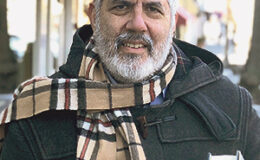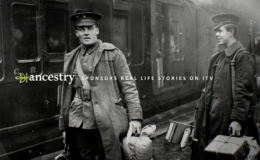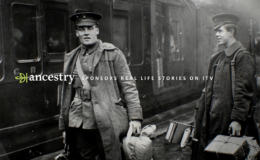
The Chronicle heard from dozens of readers with their own stories of genetic testing after it published the account of three strangers who discovered they are half siblings conceived at the same Palo Alto fertility clinic. Here are a few of those stories:

Carlos Aguilar (left) spends time with younger brother Mark Patron at the Chit-Chat Cafe in Pacifica. Aguilar, who was adopted at 2 months old, found out less than a year ago that he has five full siblings, including Patron.
(Gabrielle Lurie / The Chronicle | San Francisco Chronicle)
Discoveries ‘came like a tsunami’
Carlos Aguilar, 64, had never had much interest in pursuing his biological mother and father. The parents who adopted and raised him were wonderful and all he ever needed.
So when he did genetic testing it was at the request of his children, who were curious about their shared medical history. Then, when the results came back, it was a relative with an interest in genealogy who insisted on trying to track down his biological family.
A few weeks later, that relative sent him a photo from a 1955 Mission High School yearbook. “I dropped my phone,” Aguilar said. “I was looking at myself. It was my spitting image. And then the information came like a tsunami.”
The person in the photo was his father. Soon, Aguilar learned he was the eldest of six children. His biological parents had been teenagers when he was born and placed him up for adoption, but after high school they’d married and raised their other five children in San Francisco. Aguilar grew up not so far away, in Atherton.
“The whole time my family lived 45 minutes from me,” Aguilar said. He thinks he may have even met one or two siblings when he worked for a while at Bud’s Ice Cream shop in Noe Valley.
The timing of finding them wasn’t great, though. His first letter to the family, sent to the oldest sibling, arrived on Aug. 22, 2018 — two days after their father had died, he learned later. None of them had ever heard of another sibling, and some didn’t respond well to the letter.
But eventually he heard back from a brother, and they met at a Starbucks in San Francisco. His brother was shy and hesitant at first. “He couldn’t really look me in the eye,” Aguilar recalled.
“Then all of a sudden he said, ‘God, look at your hands. Your thumbs — you have the same thumbs I do,’” Aguilar said, laughing at the memory. After that meeting, Aguilar was introduced to more family: aunts and uncles who told him he had his mother’s ears and his father’s eyes, siblings who look just like Aguilar’s son.
He regrets that he never got to meet his biological parents; his birth mother died in 2010. And two of the siblings haven’t wanted to meet him yet.
Redefining Family Many unprepared when genetic testing results arrive. Read the story here.
“But the three siblings I’ve met have been so welcoming and loving, and if that’s it, that’s fine with me,” Aguilar said. “I would love to meet the others, even if they’re not looking for anything other than hello. But it’s already way more than I ever expected.”
‘It just kind
of undid me’
Renee Goldhammer, 73, was raised on stories of her parents’ harrowing escapes from Europe just before World War II. Much of her mother’s family was killed during the Holocaust. Her father’s immediate family got out, and though she was an only child, she grew up surrounded by paternal aunts and uncles and cousins.

Renee Goldhammer recently found out after taking a DNA test that the man who raised her was not her biological father.
(Michael Short / Special To The Chronicle | San Francisco Chronicle)
When she heard about genetic testing, she thought it sounded like fun. Though Goldhammer was primarily Ashkenazi Jewish, she had always looked more Northern European and her family had sometimes joked that Vikings must have raided her ancestors’ villages. She was curious to see what her DNA would show.
What she got was a message from a woman who identified herself as a half sister. Goldhammer didn’t believe it at first, but a little sleuthing exposed the truth: They shared a biological father, and it wasn’t the man who had raised Goldhammer.
“Getting gobsmacked by that at the age of 72, it just kind of undid me,” she said.
She and her half sister figured out that Goldhammer’s mother and the other woman’s father must have had an affair. Goldhammer doesn’t know if her father ever knew, and both of her parents are dead so there’s no one to ask. They were married for 48 years. They always seemed happy.
“It almost feels like I lost my father again. I lost him once when he passed away, and now I lost that biological connection,” she said. “I lost my identity to a certain degree.”
A year after she made the discovery, she’s still grieving. There are silver linings, though. Her father had glaucoma, a condition that can cause blindness and is often hereditary. Goldhammer used to get tested for it every year. On her next visit, she plans to ask her doctor if she can stop.
And she’s enjoying getting to know her half sister. Goldhammer lives in Oakland and her sister on the East Coast, but they’ve met. They’re still exploring their new bond.
“The bottom line for me is, I have compartmentalized this,” she said. “Having a sister is positive. But, on the other side, I’m absolutely heartbroken about my dad.”
New relatives,
with a twist
Growing up, Karen Thomas, 75, had a cousin “Alma” — not her real name — who was “the worst black sheep ever.” She was a longtime alcoholic whose lone daughter was raised by Thomas’ aunt. Alma died young and was spoken about only in whispers.
Three years ago, genetic testing revealed that Alma had two other children, a boy and a girl. The daughter reached out to Thomas, who was the closest family she could find.
It turned out that the other two children had been taken away and placed in foster care without anyone in Alma’s family ever knowing they existed — at least as far as Thomas knew. Thomas had never known her cousin Alma, and she felt bad that she didn’t have many stories or photos to share, but the children were happy to learn what they could.

Karen Thomas, 75, of Lafayette connected with estranged cousins she found through the database of 23andMe, a genetic testing service in Mountain View.
(Sarahbeth Maney / Special To The Chronicle | San Francisco Chronicle)
“They seemed like good, decent people,” said Thomas, who lives in Lafayette. “I think they’d had hard lives. They seemed to have good hearts.”
The daughter friended Thomas on Facebook. “She would post little cartoons, or needlepoint she’d done,” Thomas said. Then one day she posted an antigay meme. Thomas was horrified, but replied only that she was disappointed. Some people are just close-minded, she thought.
A few weeks later, the daughter posted something else, a political “hit piece” on Hillary Clinton. Thomas realized she was a supporter of President Trump, which was a deal breaker for her. “I didn’t respond, just unfriended her. And that was that. I never heard another word,” Thomas said.
Unsettling revelations
It can be unsettling, and even traumatic, for an adult to learn she was conceived through artificial insemination. But the news was especially upsetting for Kelly Lethin, partly because of the way it was revealed.
Eleven years ago, Lethin and her husband were talking about starting a family. Lethin mentioned to her mom that their friends often joked that she and her husband looked so alike they could be siblings. Her mother didn’t think that was funny, and she confessed: Because she’d used an anonymous sperm donor, she couldn’t be sure that Lethin and her husband weren’t somehow related.
And that was how she shared a secret that had been kept Lethin’s entire life. Lethin and her husband quickly figured out that they weren’t related, and they’re now raising two healthy sons in San Bruno. But learning that the man who raised her was not her biological father was awful.
It shook up Lethin’s identity, like there was an entire half of herself that she didn’t know anything about.
When genetic testing revealed two years ago that she had half siblings — 17 of them so far — through the same sperm donor, it was a relief. She had people who understood what she was going through, and who could also help her explore the parts of her identity that she felt she’d lost.

Alithea Zetter (left) and half sister Kelly Lethin chat at a restaurant in Woodside with lunch patron Deanna Osborne about their story of how they discovered they were related. Lethin found out through genetic testing that she has at least 16 half siblings from the same sperm donor. Many of them have met and keep in regular touch.
(Gabrielle Lurie / The Chronicle | San Francisco Chronicle)
They’ve had sibling get-togethers, including a “pilgrimage” to the Palo Alto offices of the fertility clinic where they were all conceived, and playdates among their children, who are cousins.
“What humans need are two things: a sense of belonging and a sense of meaning,” said Lethin, 40. Her squad of half brothers and sisters has returned some of that to her.
“They’re a type of family I didn’t know I had room for,” she said. “I learn so much about myself when I learn about them. But I also just really like them.”
Erin Allday is a San Francisco Chronicle staff writer. Email: eallday@sfchronicle.com Twitter: @erinallday














